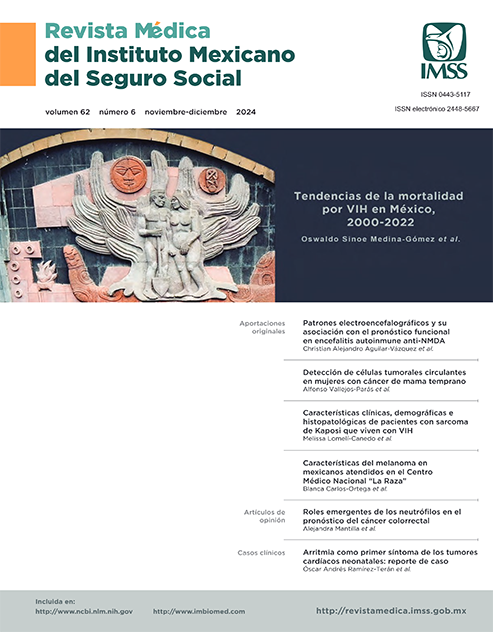Reporte de caso en población mexicana de trastorno asociado al gen BCL11B
##plugins.themes.themeEleven.article.main##
Palabras clave
Discapacidad Intelectual, Trastornos del Desarrollo del Lenguaje, Secuenciación del Exoma, Anomalías Craneofaciales / Intellectual Disability, Language Development Disorders, Exome Sequencing, Craniofacial Abnormalities
Resumen
Introducción: las variantes del gen BCL11B se asocian con el trastorno del desarrollo intelectual con retraso del habla, facies dismórficas y anomalías de las células T (IDDSFTA) (OMIM 618092). La presentación clínica incluye desórdenes del neurodesarrollo (retraso psicomotor, discapacidad intelectual, retraso del lenguaje, características del espectro autista), dismorfias faciales y manifestaciones inmunológicas (asma, alergias, disminución de células T). El objetivo de este trabajo es presentar un caso de IDDSFTA en población mexicana con una variante probablemente patogénica no reportada previamente y compararlo con lo descrito en la literatura.
Caso clínico: paciente hombre de 4 años 6 meses con retraso del neurodesarrollo y lenguaje, de padres sanos, no consanguíneos. Presenta lenguaje incomprensible, atención conjunta, plagiocefalia, epicanto bilateral, fisuras palpebrales cortas, nariz con punta prominente, filtrum largo, plano Likert 4, labios delgados, boca pequeña, apiñamiento dental, hipodoncia, pabellones auriculares de implantación limítrofe, pezones pequeños y teletelia. Se realizó WES que reportó variante probablemente patogénica del gen BCL11B.
Conclusión: conforme a la información disponible, la variante detectada no ha sido descrita en la literatura, es el primer caso reportado de esta patología en población mexicana. Las manifestaciones clínicas del paciente concuerdan con las descritas del IDDSFTA lo que sustenta que esta variante probablemente patogénica sea la etiología del fenotipo en nuestro paciente.
Referencias
OMIM: Online Mendelian Inheritance in Man. INTELLECTUAL DEVELOPMENTAL DISORDER WITH SPEECH DELAY, DYSMORPHIC FACIES, AND T-CELL ABNORMALITIES; IDDSFTA. Baltimore, MD, EUA: Johns Hopkins University; 2018. Disponible en: https://www.omim.org/entry/618092.
Yu Y, Jia X, Yin H, et al. A novel variant in BCL11B in an individual with neurodevelopmental delay: A case report. Mol Genet Genomic Med. 2023;11(4):e2132. doi: 10.1002/mgg3.2132.
Lessel D, Gehbauer C, Bramswig NC, et al. BCL11B mutations in patients affected by a neurodevelopmental disorder with reduced type 2 innate lymphoid cells. Brain. 2018;141(8):2299- 2311. doi: 10.1093/brain/awy173.
OMIM: Online Mendelian Inheritance in Man. IMMUNODEFICIENCY 49; IMD49. Baltimore, MD, EUA: Johns Hopkins University; 2016. Disponible en: https://www.omim.org/entry/ 617237.
Prasad M, Balci TB, Prasad C, et al. BCL11B-related disorder in two canadian children: Expanding the clinical phenotype. Eur J Med Genet. 2020;63(9):104007. doi: 10.1016/j.ejmg. 2020.104007.
Wang Y, Zhang F, Gao N, et al. Differential expression of BCL11b and CDKN2A in CD30-positive peripheral T cell lym[1]phoma: Retrospective study. Medicine (Baltimore). 2023;102 (46):e35531. doi: 10.1097/MD.0000000000035531.
Lu HY, Sertori R, Contreras AV, et al. A Novel Germline Heterozygous BCL11B Variant Causing Severe Atopic Disease and Immune e Dysregulation. Front Immunol. 2021;12:788278. doi: 10.3389/fimmu.2021.788278.
Gaillard L, Goverde A, van den Bosch QCC, et al. Case Report and Review of the Literature: Congenital Diaphragmatic Hernia and Craniosynostosis, a Coincidence or Common Cause? Front Pediatr. 2021;9:772800. doi: 10.3389/fped.2021.772800.
Goos JAC, Vogel WK, Mlcochova H, et al. A de novo substitution in BCL11B leads to loss of interaction with transcriptional complexes and craniosynostosis. Hum Mol Genet. 2019;28 (15):2501-2513. doi: 10.1093/hmg/ddz072.
Ang PS, Matrongolo MJ, Zietowski ML, et al. Cranium growth, patterning and homeostasis. Development. 2022;149(22): dev201017. doi: 10.1242/dev.201017.
Daher MT, Bausero P, Agbulut O, et al. Bcl11b/Ctip2 in Skin, Tooth, and Craniofacial System. Front Cell Dev Biol. 2020;8: 581674. doi: 10.3389/fcell.2020.581674.
Eto K, Machida O, Yanagishita T, et al. Novel BCL11B truncation variant in a patient with developmental delay, distinctive features, and early craniosynostosis. Hum Genome Var. 2022; 9(1):43. doi: 10.1038/s41439-022-00220-x.
Che F, Tie X, Lei H, et al. Identification of two novel variants of the BCL11B gene in two Chinese pedigrees associated with neurodevelopmental disorders. Front Mol Neurosci. 2022;15: 927357. doi: 10.3389/fnmol.2022.927357.
Punwani D, Zhang Y, Yu J, et al. Multisystem Anomalies in Severe Combined Immunodeficiency with Mutant BCL11B. N Engl J Med. 2016;375(22):2165-2176. doi: 10.1056/NEJMoa1509164.
Qiao F, Wang C, Luo C, et al. A De Novo heterozygous frameshift mutation identified in BCL11B causes neurodevelopmental disorder by whole exome sequencing. Mol Genet Genomic Med. 2019;7(9):e897. doi: 10.1002/mgg3.897.
Homma TK, Freire BL, Honjo Kawahira RS, et al. Genetic Disorders in Prenatal Onset Syndromic Short Stature Identified by Exome Sequencing. J Pediatr. 2019;215:192-198. doi: 10.1016/j.jpeds.2019.08.024.
Harrer P, Leppmeier V, Berger A, et al. A de novo BCL11B variant case manifesting with dystonic movement disorder regarding the article “BCL11B-related disorder in two canadian children: Expanding the clinical phenotype (Prasad et al., 2020).”. Eur J Med Genet. 2022;65(11):104635. doi: 10.1016/j. ejmg.2022.104635.
Yang S, Kang Q, Hou Y, et al. Mutant BCL11B in a Patient With a Neurodevelopmental Disorder and T-Cell Abnormalities. Front Pediatr. 2020;8:544894. doi: 10.3389/fped.2020.544894.
Alfei E, Cattaneo E, Spaccini L, et al. Progressive Clinical and Neuroradiological Findings in a Child with BCL11B Missense Mutation: Expanding the Phenotypic Spectrum of Related Disorder. Neuropediatrics. 2022;53(4):283-286. doi: 10.1055/ s-0041-1736193.
Roa-Bautista A, López-Duarte M, Paz-Gandiaga N, et al. Deletion in the BCL11B Gene and Intellectual Developmental Disorder with Speech Delay, Dysmorphic Facies, and T-cell Abnormalities - a Case Report. EJIFCC. 2022;33(4):325-333.


